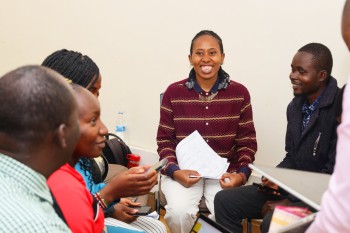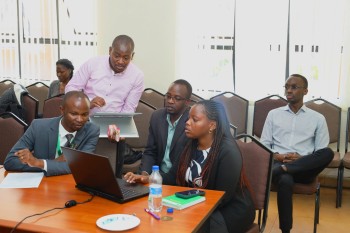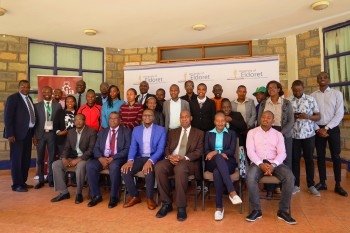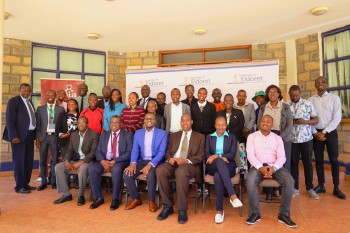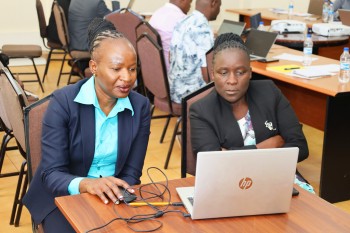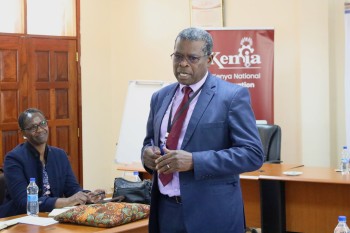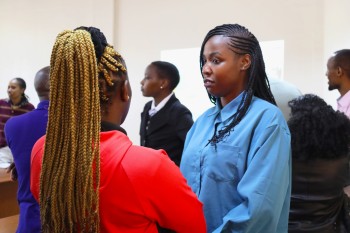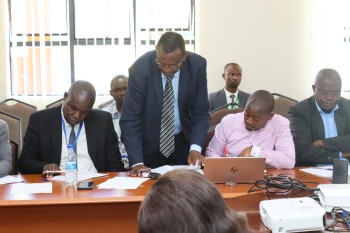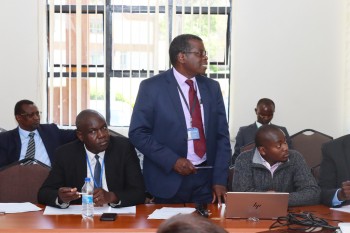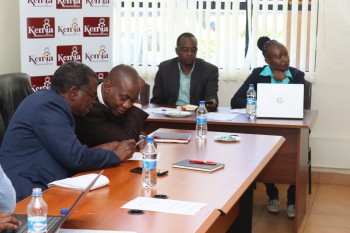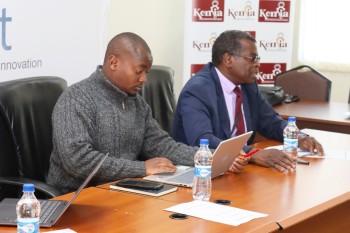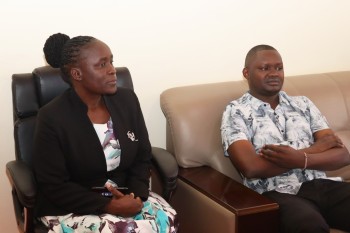The University of Eldoret is among 11 universities in Kenya in Cohort 3 of the Institutional Commercialization Support Program, by the Kenya National Innovation Agency (KeNIA), to enhance the entrepreneurial maturity of higher learning institutions.
On 8 October 2025, the University hosted a delegation from KENIA for the first phase of the IS program, which involved conducting the Entrepreneurial Institutions Maturity Framework (EIMF) Self-Evaluation and Masterplan Development exercise.
The day marked a significant step in strengthening the University’s innovation and commercialization ecosystem. The KeNIA team facilitated a series of sessions, including an introduction to the EIMF tool, guided self-assessment, and alignment discussions towards the development of the Institutional Commercialization Masterplan.
The University went through a guided self-evaluation exercise assessing institutional performance across the following seven key domains.
- Leadership and Governance – Evaluating vision, strategy, and institutional structure.
- Finance – Assessing incentives, budgets, and sustainability of commercialization efforts.
- Infrastructure – Reviewing technology transfer offices, incubators, and digital/fabrication labs.
- Human Capital and Culture – Examining skills, capacity building, and entrepreneurial mindset.
- Innovation Policies and Strategies – Gauging awareness, implementation, and effectiveness.
- Entrepreneurship Education – Looking into curricular and experiential learning integration.
- Industry, Alumni, and Community Linkages – Assessing engagement with external stakeholders to support the innovation and entrepreneurship landscape.
The University of Eldoret delegation was led by Prof. Godfrey Netondo, Deputy Vice-Chancellor (Academic and Student Affairs), and Prof. Gelas Simiyu, Acting Deputy Vice-Chancellor (Planning, Research and Extension). The program was supported by Dr. Caroline Ayuma, Chair, Innovation, Incubation and Commercialization Centre (IICC), and Dr. Becky Aloo, Head, Intellectual Property Management Office (IPMO), who form part of the Institutional Working Group (IWG) in the Program. Also in attendance were faculty representatives from the Innovation Planning Committee, members of the IICC, staff representatives from different Schools, postgraduate, and undergraduate students actively involved in innovation and entrepreneurship initiatives.
The self-evaluation exercise was followed by an overview of the results and identification of gaps for strategic improvement and planning. The self-evaluation exercise placed the University of Eldoret at Level 2 of the EIMF, categorizing it as an Emerging Entrepreneurial Institution. This level signifies that while the University has initiated commendable efforts to boost entrepreneurship, innovation, and research commercialization, with at least one dedicated structure supporting technology transfer and innovation incubation, however, with limited resource allocation and operational challenges.
The University scored highly in leadership and management structures, human capital, and industry-alumni-community linkages, which provide a strong foundation for innovation and entrepreneurship. Moderate performance was recorded in the areas of funding, entrepreneurship education, infrastructure, and innovation policies. The evaluation further revealed that although the University engages with industries and partners to support its innovation ecosystem and has developed key innovation and startup support policies, the awareness and implementation levels remain below 5%, calling for more concerted efforts to increase awareness and implementation.
The discussion also focused on how to use the self-evaluation outcomes in the development of the Institutional Commercialization Masterplan. Following the self-evaluation exercise, a Peer Evaluation Exercise is scheduled for 16 November 2025, where the University of Eldoret will be paired with another institution of higher learning participating in the Program to conduct a reciprocal assessment of each other’s entrepreneurial maturity levels. Using insights from both the self and peer evaluations, the University of Eldoret will work with KeNIA experts to develop an Institutional Innovation and Commercialization Masterplan to guide strategic growth over the next 3–5 years. The Masterplan will provide a roadmap for strengthening entrepreneurship and innovation systems, enhancing industry linkages, and positioning the University as a world-class entrepreneurial institution.
The University of Eldoret remains committed to building an enabling ecosystem for innovation—one that empowers students and staff to transform ideas into viable prototypes, startups, and enterprises. The goal is to make innovation not just a concept, but a culture and lifestyle across the institution.

